Buckwheat with the taste of death. Four weeks of the occupation of Irpin through the eyes of Kuzia the shaggy dog
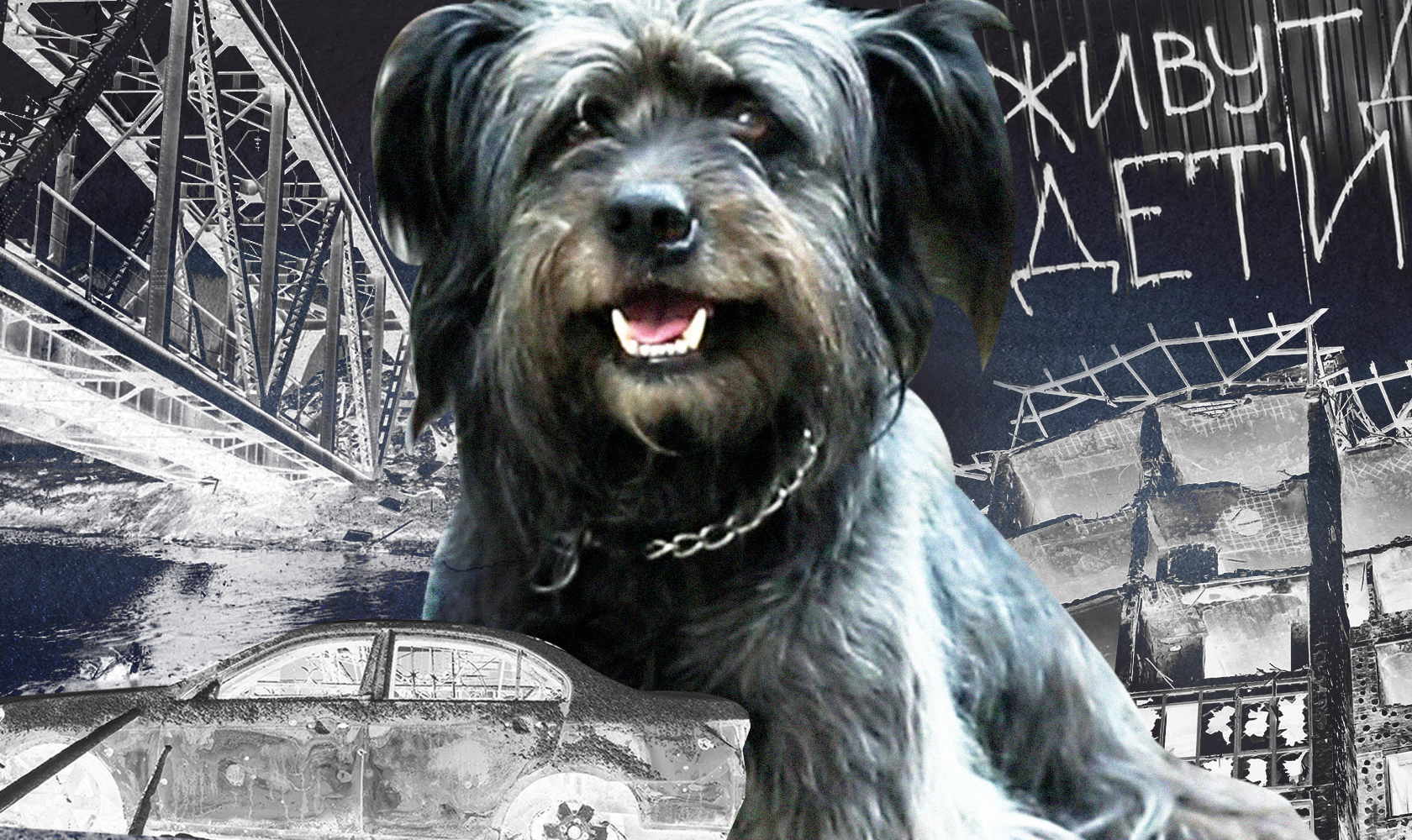
March 2022. Irpin is partially occupied by the Russians. A large black and grey dog wanders the streets of the city.
The world is upside down in his eyes. The basements where homeless dogs used to hide away from the cold are now inhabited humans. Things fly and fall from the sky, making the houses catch fire and collapse like dog houses. The air smells of burning and soot. The streets are lined with humans having a rest, and for some reason they don't move.
On Davydchuk Street alone, the little homeland of Kuzia the black and grey dog, more than a dozen people were shot by the Russians. And in total, in four weeks, they killed more than 300 civilians in Irpin.
Animals have always been there alongside people in trouble. Here, the events of Irpin’s toughest weeks, when it was flooded with two-legged invaders, are seen through a dog’s eyes.
All the characters in this story are real; any coincidence of names and addresses is not accidental.
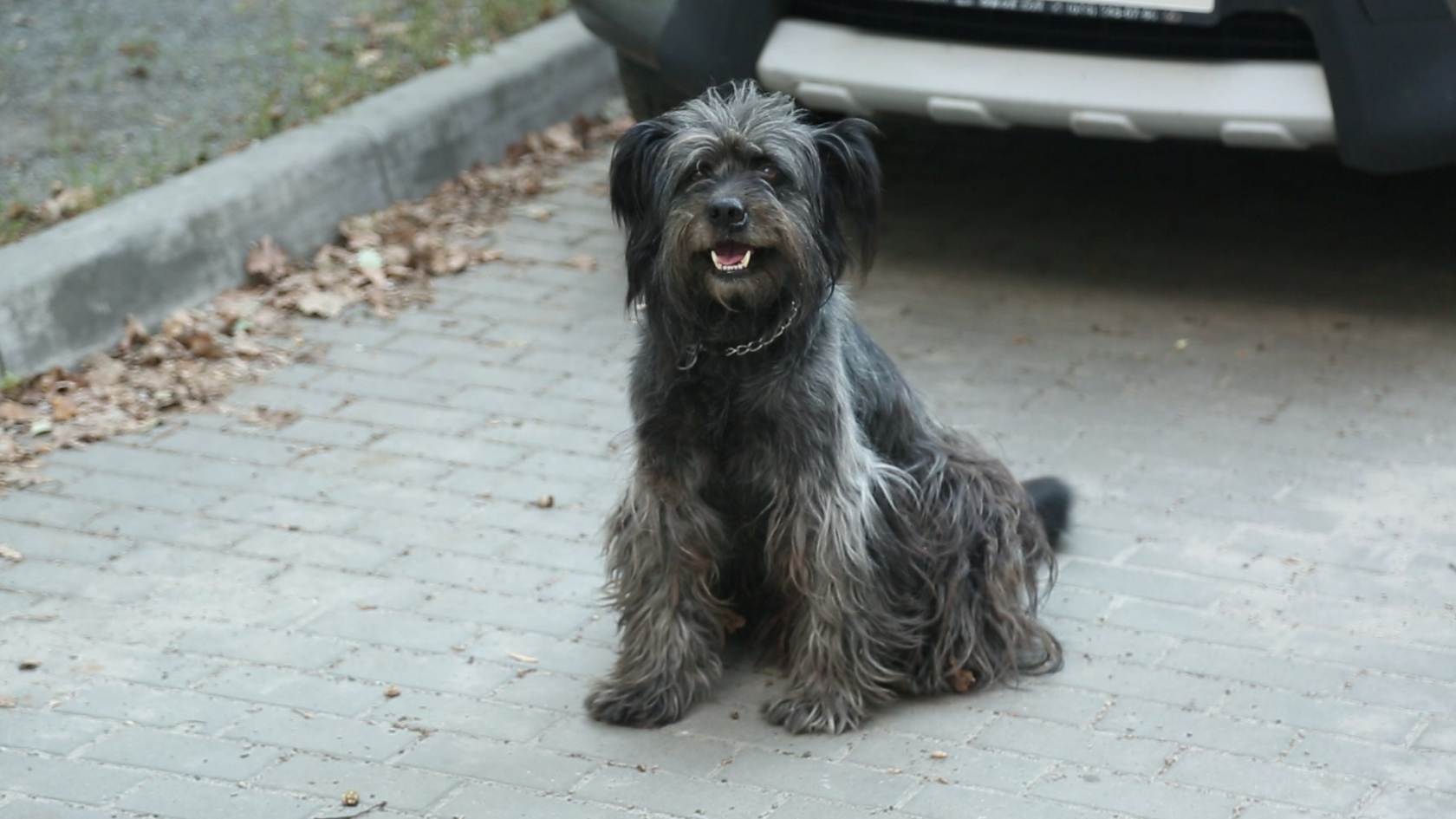
Kuzia: Every dog here has known me for the seven years of my life in Irpin
Chapter one, in which Kuzia the "scrounger" recalls the smells of pre-war Irpin
My name is Kuzia. I’m a dog who lives in Irpin, near the Lastivka children’s sanatorium (health resort). Several of its old buildings are hidden amid the forest - one of the few green areas of the city that survived the developers.
The Irpin I know smells of pine needles and leaves, especially after rain. The scent mingles with exhaust fumes from the cars - there are more of them every year - and smoke rising from barbecues near the private houses and the river bank.
My city was best heard in the morning, when thousands of the two-legged ones would leave for Kyiv for work, and in the evening, when they would return home.
Why my canine god chose this particular place on Earth for me, no one knows. My first owner, Andrii, recalls that in 2015, when I was still a tiny puppy, I was abandoned under their lilac-coloured fence that had a lily painted on it.
Auntie Nina, a member of Andrii’s family who owned the house at 14 Lermontova Street, didn’t want a dog. She used to chase me away from their fence, but she gave up eventually.
My first owners were sure that I’m a Tibetan terrier. Dogs of this breed change the colour of their coat over time. The same thing happened to me - my pitch-black fur turned grey.
I don’t know whether I am actually descended from the dogs of some Tibetan monks, but who am I to stop the humans from thinking that? Especially since I definitely have at least one thing in common with terriers - a love of freedom.
My owners tried to chain me up, like a guard dog. But that is definitely not my calling. I did everything I could to release myself from the iron chain - I hung on it like a suicide bomber. Or dug deep holes under the fence which were more like long bunkers.
Slightly greying, with long, dishevelled fur and a hunk of iron chain around my neck, I eventually escaped from the yard. I’d mostly hang around the surrounding streets of Lermontova, Davydchuk, Kyivska and Lysenko, but I’d call in to Pushkinska and visit the centre of Irpin.
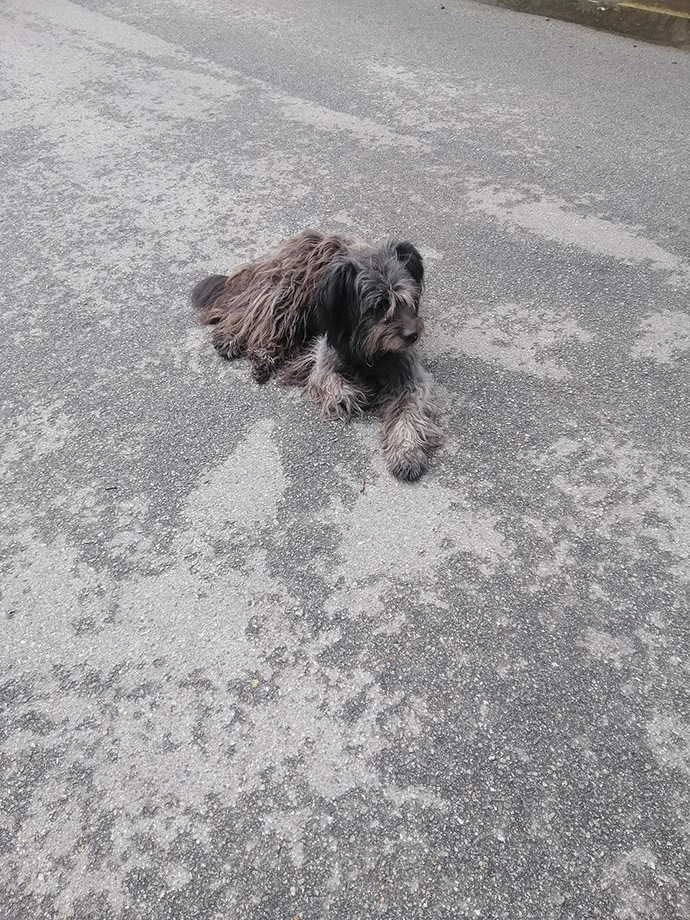
Kuzia: I was called a "scrounger", because Kuzia was known in every yard. The humans who lived in the Aristocrat residential complex even tried to set up a kennel for me in their yard
I never went hungry. I could squeeze through the gates of certain houses where the owners always brought me out something to eat. Sometimes I didn’t even have to move a paw, as kind-hearted humans would throw food down to me from the balconies of their high-rise buildings.
One of my favourite places in Irpin is the intersection of Davydchuk and Lermontova Streets. There were cars, which I loved to chase, and a house near the crossroads where I could always find food, and it’s a good observation point – a real paradise for a dog.
Chapter two, in which pieces of iron fly down from the sky, and strangers come to the streets of Irpin
It was nearly the end of winter, the time when humans become helpless, like dogs without fur, so they put on all the clothes they have. I shouldn’t grumble about my natural fur coat, but sometimes it wasn’t enough to protect me from the cold. Especially when it snowed – I used to gnaw the snow out of my long fur.
Fortunately, dogs have no sense of time – a moment for us is the same as an eternity. So I don’t know how much time has passed since that dawn when I was woken by dull sounds coming from the sky. There was a commotion going on. Nervy humans were walking around with their stuff, which they were packing into their cars, and dozens of cars were driving past. For some reason I didn’t feel like chasing them that morning. I kept hearing the word "war" everywhere.
The very next morning, I heard a loud explosion on the way out of the city: the bridge over the Irpin River was blown up. However, many of the humans were undeterred by this. They were still trying to leave: either they took other roads, or they left their cars in front of the bridge and crossed the river.
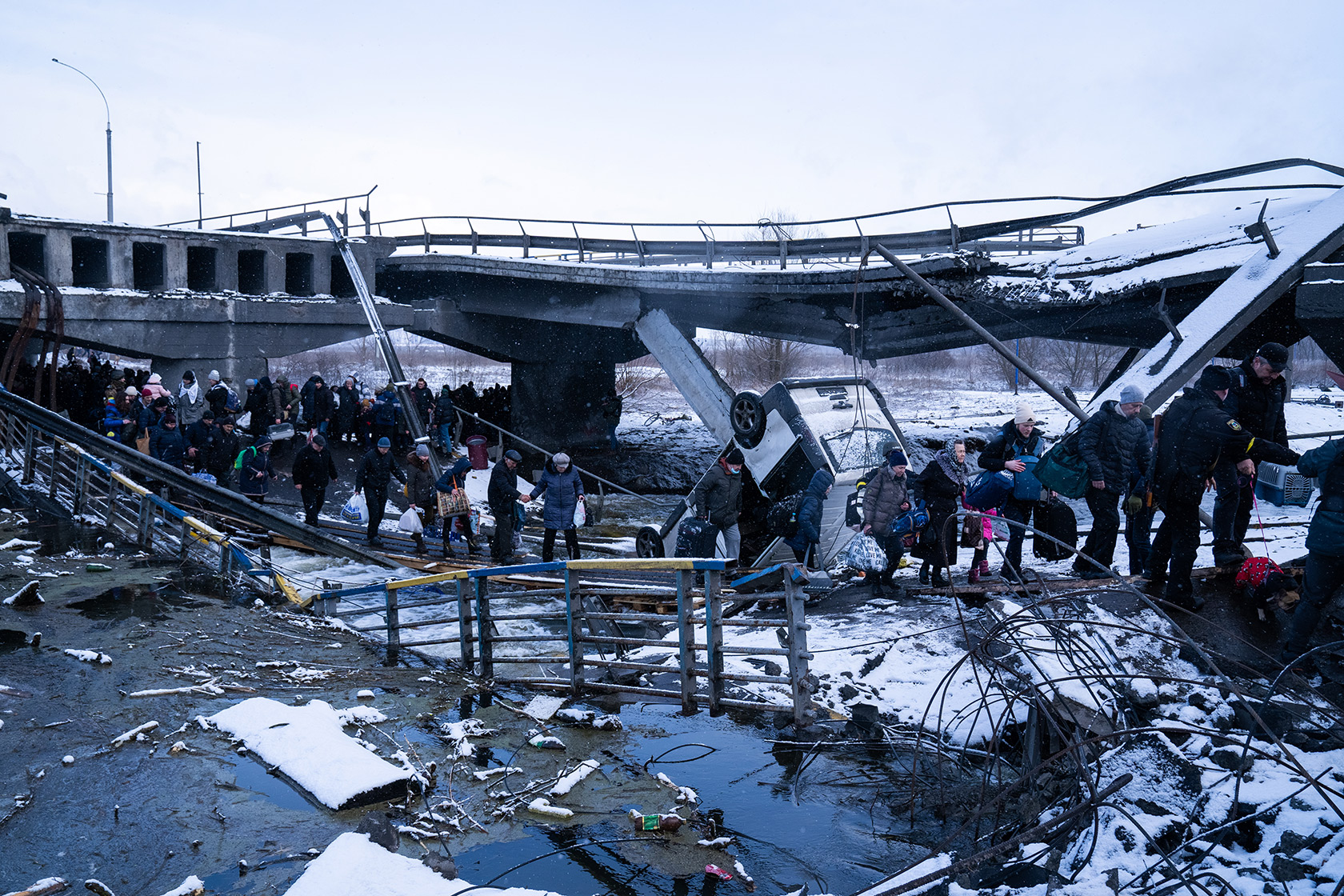
People evacuating from Irpin under the ruined road bridge
Terrified cats and dogs started running around my neighbourhood - they’d been abandoned by their owners, or had worked their way free from their chains themselves. I personally saw a huge confused Alabai (Central Asian shepherd dog) running around randomly. The people who had decided to stay in the city stared out of their windows at the black smoke billowing from the neighbouring villages.
Then pieces of iron began to "fly" out of the sky towards us. The shrill whistling sound hurt your ears. It made me freak out, and I’d try to hide and nervously bite out the tangles from my fur.
When the pieces of iron hit people’s homes, the windows would fly out, the roofs would be blown off, or the whole building would fall to pieces like a dog house. Fires broke out here and there. But for some reason, those men in helmets in big red cars with sirens did not come to us as they used to. Sometimes the humans put the flames out themselves, but often houses would burn for several days. Then the air would be filled with smoke and acrid fumes.
Some of the humans left the Aristocrat residential complex, while others gathered together and waited out the shelling in the basement of the building. Then the humans started making bonfires in the middle of the children’s playground.
They cooked food on the fire. I always loved the delicious morsels I got from this grey-haired, moustached man and his wife, a petite blond woman who was always by his side. The man’s name was Yevhen Mykolaiovych, and his wife was Valentyna.
The humans from the surrounding houses moved into the unfinished house of a gypsy baron (gypsy community leader – ed.) across the street from the five-storey Aristocrat building. They covered the ground-level windows with sandbags and put planks in the basement, which had become their kennel. It smelled of damp, the food that people brought here, and concrete from the rough walls inside.
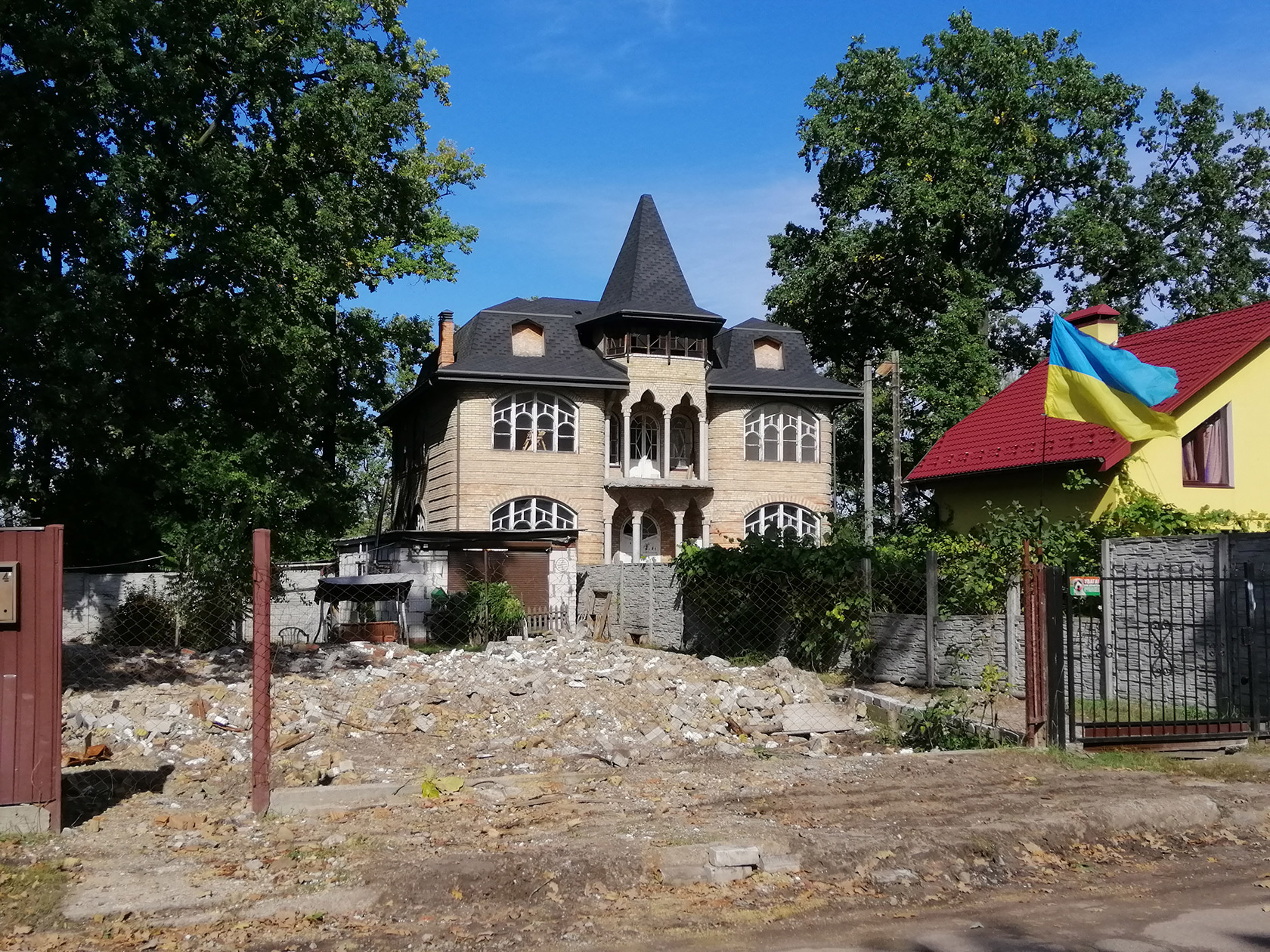
In the basement of this house, dozens of Irpin residents hid from the "Russian world" (the concept of the total domination of Russian culture over other cultures; it gives rise to and "legitimises" Russia’s current expansionist, colonial politics – ed.)
In order to keep warm, the humans wore their warmest clothes and slept in tents. They even took their pets with them. Like Mike, a Staffordshire terrier. His owner was a tall, well-built man named Dmytro. There was also a labrador called Iryska and her owner, Lev, in the basement.
A few days later, strangers with weapons appeared - I had never seen them in Irpin before. They reeked of burnt things, diesel oil, stale clothes and unwashed bodies. And, of course, fear. The smell of human fear is unmistakable, especially if you are a dog.
They walked my streets as if they were the masters here and ordered the others around. The strangers were always on their guard, turning abruptly at the slightest sound and looking around in confusion. If they’d had tails, they would probably have kept them down out of fear.
They settled in the former Irpin sanatorium and the Lastivka camp. They weren’t averse to staying in people’s homes either – they’d break the doors down and move in.
They parked their equipment along the streets and in the middle of yards. Sometimes they hid it, as if they were playing some game. But they couldn’t fool me. I quickly found one of those ambushes.
At the intersection of Lermontova and Kyivska Streets, the long barrel of a tank peered out between the wooden fences. This was the place where the strangers talked to Vitalii for the first time - he was one of the humans who’d moved to the gypsy baron’s house. Some tall, well-built strangers in uniforms with little white, blue and red patches on their shoulders approached him.
"How many kilometres is it to Kyiv from here?"
Vitalii, taken aback, replied that it was not far, and cautiously went on his way.
"Take care, man!" the strangers shouted.
Later, I figured out why they said that. They started hunting people like wild animals: shooting at the cars full of people who were trying to get out of the city. This happened to one of the cars that drove down our street. The man and the woman in the car were shot dead. Their bodies remained there for a few days, until the humans who lived in a neighbouring house got them out and buried them in a yard nearby.
Not only people, but dogs, too, were victims of the newcomers. Some were shot because their barking gave the strangers’ hiding places away. Others were killed because, out of hunger and stress, they were trying to tear pieces of meat off the humans that lay on the pavements or near the fences.
I didn’t go wild or eat corpses. I tried to stick to the humans I knew. They would always give me something to eat, and I felt safer around them. I could snuggle up at their feet, and one of them was sure to stroke my head.
My favourite crossroads at Lermontova and Davydchuka Streets reeked of danger. One of the strangers was always there in the place where the tank was hidden. They’d start shooting when anyone tried to come down to the well at the end of the street, or to get groceries on the other street, like the grey-haired man with the moustache who always smelled of food.
Now I needed not only to hide from the shelling, but also to watch carefully where I was putting my paws. The once-clean pavements were strewn with torn-off wires, broken glass and chunks of iron.
Chapter Three, in which Iryska the labrador’s owner miraculously escapes
The humans took their supplies of food out of their fridges because there was no electricity. There was so much meat in that shelter, in the gypsy baron’s unfinished house, that even Iryska and Mike were fed kebabs.
I got them sometimes as well. I was always drawn by the smell of food when people were cooking outside in the yard. Sometimes the strangers would start shooting at them, because they were lying on the top floors of neighbouring houses and had everyone in their sights. Or they might throw some small piece of iron which exploded, and you wouldn’t be able to see or hear anything for some time. Mike’s owner said that was the strangers’ way of having fun.
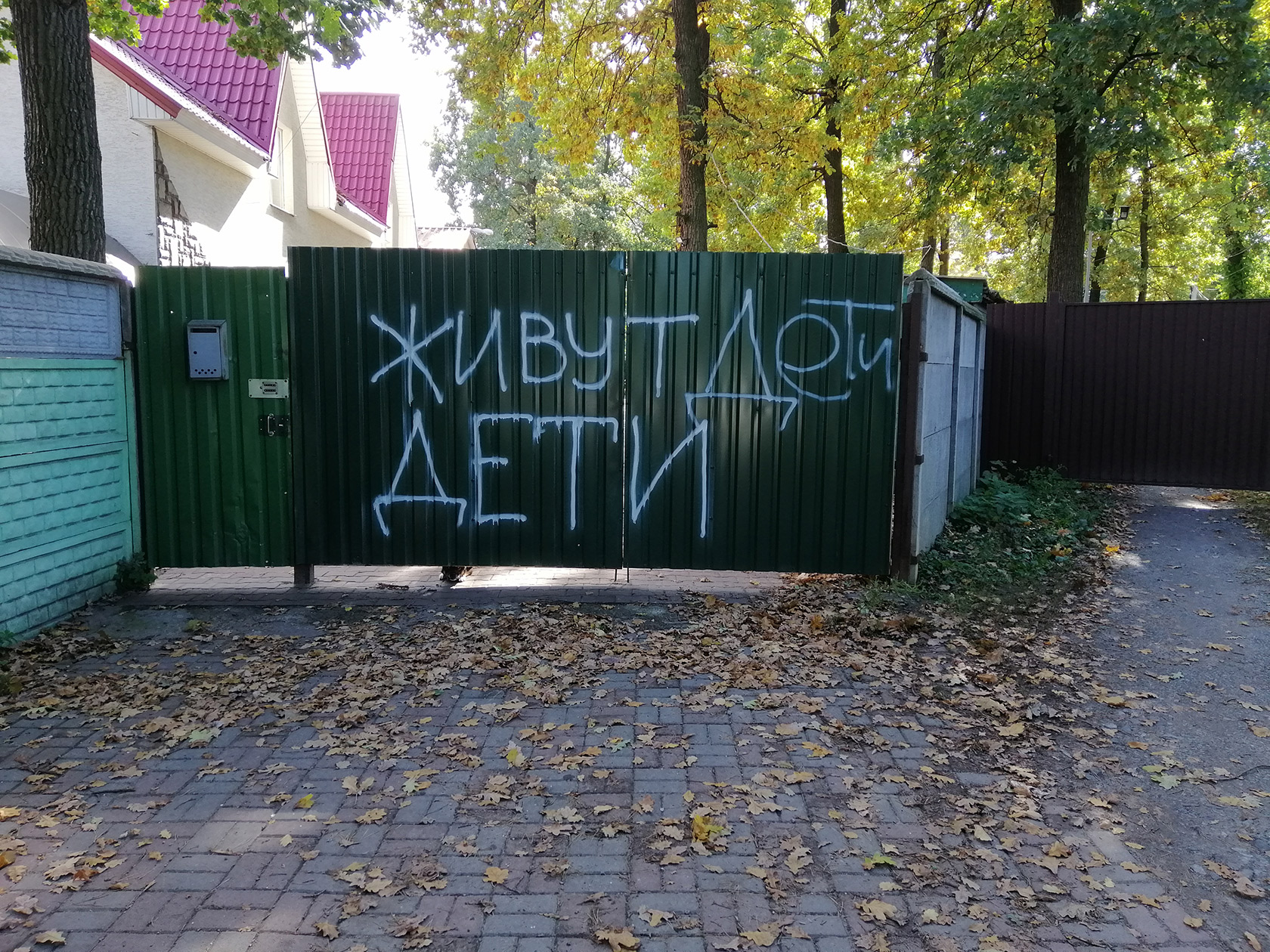
The fence of a house at one end of Davydchuka Street in Irpin, marked "Children live here" in Russian
One day, I saw four men from the gypsy baron’s house walking towards some of the strangers’ burnt-out iron vehicles in order to make something useful from them. The strangers started shooting. The men rushed off in different directions, but young Lev, Iryska’s owner, was injured.
The newcomers grabbed him, interrogated him, fired above his ear, then inserted a gun into his wound and rolled it around in the hole in his chest. I looked out of my hiding place and saw the limp body of the half-conscious Lev. The strangers dragged the half-dressed young man on top of their car and quickly drove off somewhere. I went back to my crossroads.
Later, I saw a man not far from us, holding a white piece of fabric. He could hardly drag his feet along. After a moment, Dmytro ran towards him and took him to the shelter.
Lev’s relatives made a phone call and argued with someone, pleading for someone to come and help evacuate the injured man. But their request was refused, since everyone was afraid to go to our part of the city because of the strangers.
Then, Dmytro and another man named Oleksandr got Lev into a car. They drove at top speed past all the hiding places and ambushes of the strangers, who had not expected such audacity.
Lev was successfully taken to hospital from the danger zone, and Dmytro and Oleksandr made it back safely to us.
Chapter Four, where the smell of buckwheat mingles with the smell of death
There were no calm and quiet hours in my neighbourhood any more, with all the shelling and explosions. Houses were reduced to ashes, and your eyes got used to the veil of smoke.
The five-storey building of the Aristocrat residential complex was damaged by the big pieces of iron. I saw the fire spreading on the roof very fast, and the light-coloured walls becoming charred, like a burnt piece of meat. Almost a dozen people who had been hiding in the basement from the strikes ran out, coughing from the smoke.
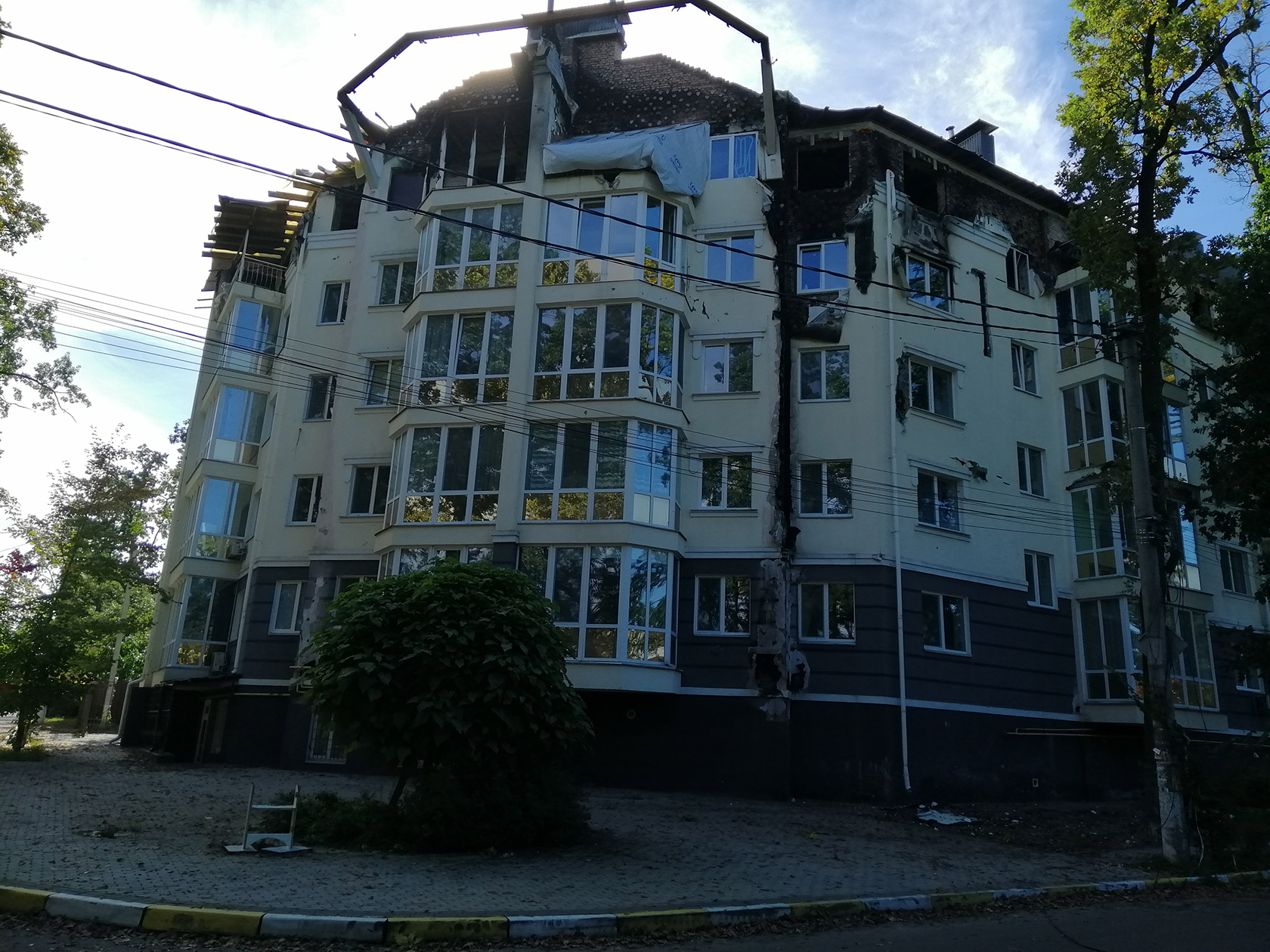
Тhis is how the five-storey Aristocrat residential complex looked six months later
A short, grey-haired man with a beard, who responded to the name Oleksandr, helped them. He gave them the keys to one of the houses nearby, so they could hide there.
A few days after the fire, the armed strangers started thoroughly checking all the houses on our road, Davydchuka Street. I was very scared, and I walked close to the ground so that they did not notice me.
Towards evening, I sensed the smell of buckwheat with meat that the grey-haired man named Yevhen Mykolayovych was cooking for all the victims of the fire. The humans were eating in the basement, and I was eating outside, eagerly wolfing down the hot buckwheat.
Suddenly, I heard the sound of the engine of a big iron vehicle carrying a group of strangers that was being driven into the yard along a narrow road. The strangers quickly jumped out of the car and ran towards the house, looking around.
The man who had fed me just a few minutes before ran out to them, waving his hands and trying to tell them something. But before he could, one of the strangers started shooting him. The man fell to the ground, and I ran away in the other direction to hide from the bullets.
From the bushes, I saw the armed humans forcing the terrified fire victims out of the basement. The strangers took them across the street to the gypsy baron’s house.
The grey-haired man with the moustache remained lying on the ground, blood pooling under his body. He still smelled faintly of buckwheat and meat. However, that smell was gradually being overtaken by a different, sweetish smell, the one that came from the motionless people lying on the pavements or under the fences in my neighbourhood.
Unlike those people, Yevhen Mykolaiovych did not stay there on the street. The strangers’ leader, whose name was Bogdan, gave permission for the murdered man’s body to be taken to the basement of the building where the humans had been hiding until recently.
After everyone had left, I came out of the bushes and lay there, stunned, next to this cellar. This small, light-coloured house was not my home. There was just a grey-haired man with a moustache lying there, who smelled of food.
I felt the coldness of the stone porch in my stomach and waited, not knowing what I was waiting for.
Chapter Five, in which Kuzia heard "Glory to Ukraine!"
In the basement of the gypsy baron’s house, Bogdan, the strangers’ leader, was already establishing his ground rules. The humans’ phones were taken away and they were forbidden to go outside as soon as it started to get grey, right up until the morning. They could walk near their shelter, but not on the road.
The strangers’ leader gave orders to his subordinates, who were afraid of him. He noticed the grey-haired, bearded man named Oleksandr and made him responsible for everything that happened in the shelter. Bogdan warned him that if anyone went out onto the road or tried to make a phone call, they would shoot Oleksandr first, and then the culprit.
Bogdan also said they had been ordered to enter Kyiv in three days. And that they had come here to liberate people from the "Banderites". The grey-haired man with a beard calmly answered that he had not seen any "Banderites" here and that he could speak freely in both Ukrainian and Russian. The stranger named Bogdan gave him a nasty look and repeated that orders were orders.
After a few days, the strangers’ leader summoned Oleksandr and told him that they were about to set off for Kyiv.
"If our people come, tell them Bogdan said no one must hurt you," he ordered, as if his name was known to all the strangers who were scurrying through my city.
In the morning, the strangers quietly left their place, started up their pieces of iron and moved to the end of my street in the direction of Vorzel. I just saw several dozen strangers walking away, followed by their armoured vehicles, on which the corpses of those from their gang who’d been killed were laid like bricks.
The humans from the unfinished house of the gypsy baron did not even realise that the strangers had left. The sun was quite high in the sky when they cautiously emerged.
None of the strangers were there when the humans took the body of the murdered grey-haired man with a moustache, who had once smelled of food, out from the basement. He was buried under a tree near a children’s swing in the courtyard of the burned-down Aristocrat residential complex.
In the evening I wandered through the yards. When from a distance I caught sight of several more strangers, in stained uniforms and with weapons in their hands, I was numb with fear.
They entered the basement and loudly shouted "Glory to Ukraine!" It sounded like a command which those who heard it were obliged to respond to.
The humans silently gazed at the strangers with suspicion and mistrust. The strangers repeated "Glory to Ukraine!" once more; then one of the humans recognised an acquaintance of his. Only then did the humans realise, by some code known only to them, that there were no more strangers on the street, and they shouted with relief, "Glory to the heroes!".
Chapter Six, in which Irpin licks its wounds, and Kuzia meets Patron
Most of those who had been hiding in the basement of the gypsy baron’s unfinished house left my area immediately. But I stayed, and I saw how my streets were changing.
First, dozens of bodies were removed from the pavements and from under the shot-peppered fences. Then workers, trucks and large truck cranes began to arrive in the city, raking up the debris of fallen trees, fragments of buildings, glass and broken wires.
Humans with dogs walked next to them, looking for pieces of iron that hadn’t exploded. Any they found were blown up on the spot or taken away somewhere. I liked the second option better, because any loud noises still make me flinch and run headlong into a corner.
For the people who lived in the Aristocrat residential complex, I became a symbol of the city’s liberation from the strangers. The first photo from the liberated city that was posted in the residents’ chat group is of a dishevelled Kuzia sitting in the middle of the brightly-coloured children’s playground.
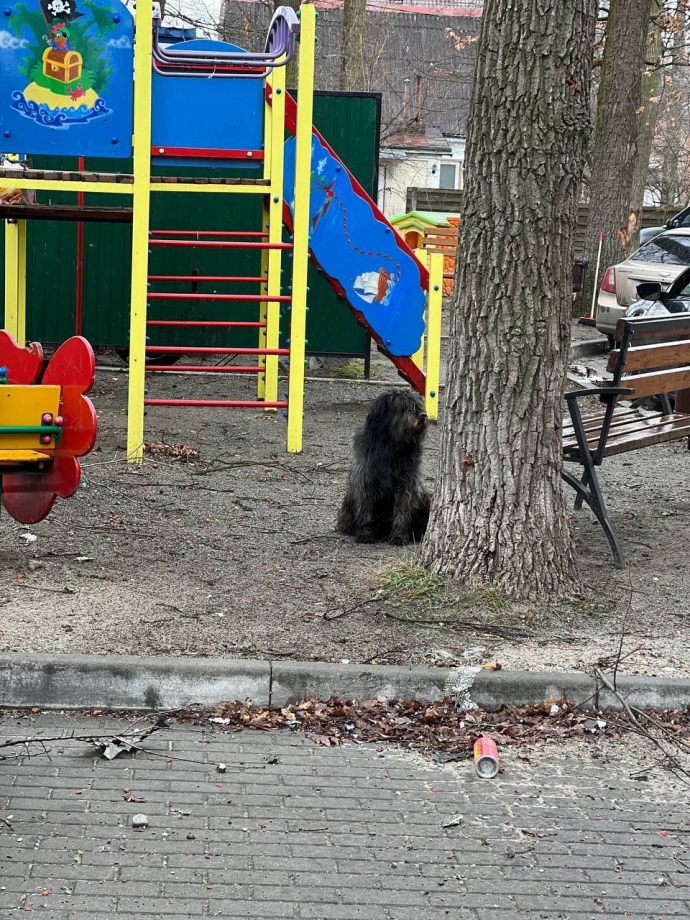
The first photo of Kuzia after the liberation of Irpen from the strangers
There have been many changes, not just in my yard, but in the city as a whole. In many streets and alleyways, you can still see the ruins of destroyed buildings, and the high-rise buildings have huge holes in the walls and demolished roofs.
Irpin has become a city of broken windows. But the windows are being replaced. I don’t ever remember seeing so many truck trailers transporting new windows around the city. The sound of renovations can be heard everywhere: the banging of hammers, the operation of cranes, the buzzing of saws and the churning of cement mixers.
The body of the man who fed me and who smelled of food was buried in another place.
How the residents of the burned five-storey building will survive the winter is not known: the building is still partially without a roof. They don’t have fur like I do, and they won’t be able to huddle around porches and cellars with me.
Seven hectares of the forest of the former Lastivka sanatorium are to be cut down, and I will no longer be able to smell my favourite scent of pine needles and leaves after the rain. The strangers have finally destroyed the old sanatorium buildings. They will be demolished, the trees will be cut down, and tall concrete boxes will be built for those left homeless.
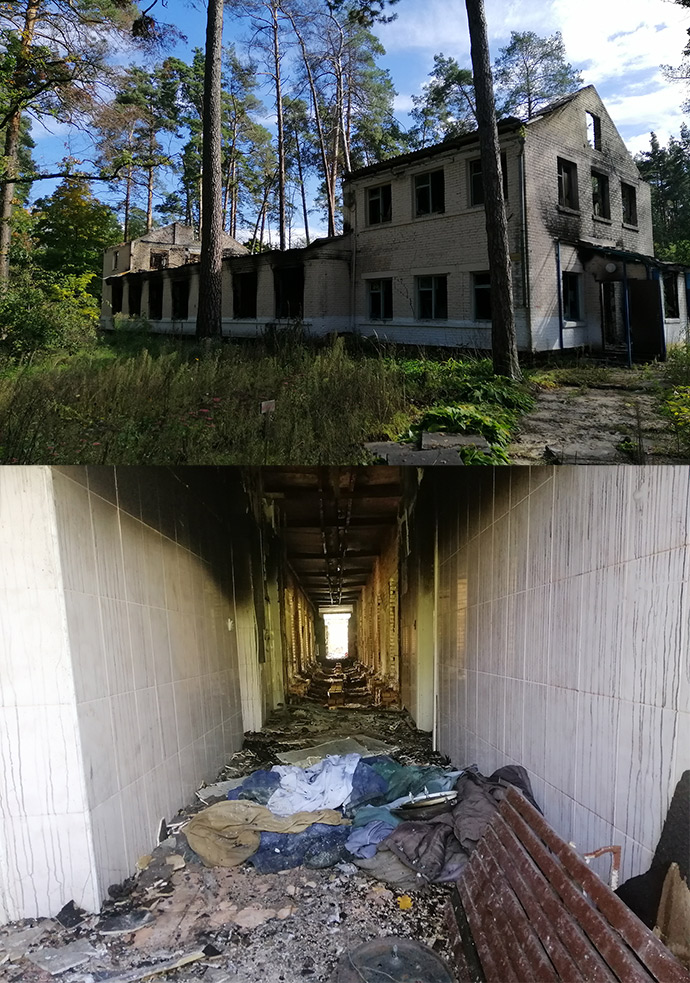
One of the buildings of the Lastivka children’s sanatorium
Irpin has become a place of pilgrimage for presidents from different countries. What’s more, the star mine-sniffing dog Patron ("Bullet") came to see us - a small white and red dog wearing a strange black vest. He opened the school, together with a dark-haired man in a khaki T-shirt - I’ve seen him on billboards, he goes by the name of Volodymyr.
How have I changed? My fur has turned even greyer. I’m not sure that’s due to my descent from the dogs of the Tibetan monks.
Iryna Lopatina, Public Interest Journalism Lab (for Ukrainska Pravda)
Translation: Elina Beketova, Myroslava Zavadska, Tetiana Buchkovska
Editing: Teresa Pearce